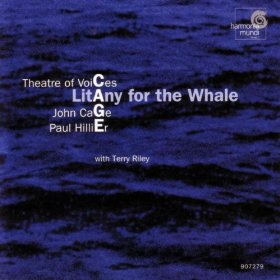Cage Litany for the Whale
View record and artist detailsRecord and Artist Details
Composer or Director: John Cage
Genre:
Vocal
Label: Harmonia Mundi
Magazine Review Date: 8/1998
Media Format: CD or Download
Media Runtime: 72
Mastering:
DDD
Catalogue Number: HMU90 7187

Tracks:
| Composition | Artist Credit |
|---|---|
| Litany for the Whale |
John Cage, Composer
Alan Bennett, Singer John Cage, Composer Paul Elliott, Tenor |
| Solo for Voice 52 (Aria No. 2) |
John Cage, Composer
John Cage, Composer Paul Hillier, Vocalist/voice Shabda Owens, Electronics |
| Five |
John Cage, Composer
Alan Bennett, Singer Allison Zelles, Vocalist/voice Andrea Fullington, Vocalist/voice John Cage, Composer Paul Elliott, Tenor Shabda Owens, Vocalist/voice |
| (The) Wonderful widow of eighteen springs |
John Cage, Composer
Alan Bennett, Closed piano John Cage, Composer Paul Hillier, Vocalist/voice |
| Experiences No. 2 |
John Cage, Composer
Andrea Fullington, Vocalist/voice John Cage, Composer |
| (36) Mesostics re and not re Marcel Duchamp |
John Cage, Composer
John Cage, Composer Paul Hillier, Vocalist/voice Shabda Owens, Electronics Terry Riley, Vocalist/voice |
| Aria |
John Cage, Composer
John Cage, Composer Paul Hillier, Bass Theatre of Voices |
| Solo for Voice 49 |
John Cage, Composer
Alan Bennett, Closed piano John Cage, Composer Paul Hillier, Vocalist/voice |
Author: Peter Dickinson
This is a landmark for Cage, Paul Hillier’s group and everyone else. Hillier says he has been interested in Cage for years – as a composer and not just an influence – and now his own considerable advocacy, which has meant so much to Arvo Part, has turned Cage into a troubadour of our global village.
The Theatre of Voices’ collection jumps right in at the deep end with Litany for the Whale (1980), a 25-minute monody with two uncannily similar voices (Alan Bennett and Paul Elliott) using only five notes in antiphonal phrases. Shut your eyes and this ritual could almost be Gregorian chant, austere and liturgical, since there are powerful associations with these voices in early music repertoire.
The scope narrows to three notes in The Wonderful Widow, where the closed piano part is slightly subdued, and the same three recur inThirty-six Mesostics (organized like an acrostic but down the middle) spoken by American minimalist Terry Riley and sung by Hillier.
Cage’s Aria (1958), for Cathy Berberian, has always been associated with one voice but this realization for seven voices and electronic sounds is thoroughly idiomatic. Experiences No. 2, another monody to a poem by e. e. cummings (who said Cage couldn’t write a tune?) is beautifully sung by Andrea Fullington but the precisely notated pauses are not always accurate. The realization of Aria No. 2 is a fastidious mix of extended vocal techniques by Alan Bennett with sounds of weather. Cage convinces us of the musical beauty of rainfall, water and thunder. Five is a vocal version of one of Cage’s late number pieces– compare the Barton Workshop or the two versions from Ensemble Avantgarde. This type of sustained writing is ideal for voices and there are recognizable meditative qualities in all these performances. The close-microphone breathing in Solo No. 22 is, like everything else here, artistic and well-engineered. Yes, Cage is too good to be left to the avant-gardists, his house has many mansions and these performances are as attractive and dedicated as any.'
The Theatre of Voices’ collection jumps right in at the deep end with Litany for the Whale (1980), a 25-minute monody with two uncannily similar voices (Alan Bennett and Paul Elliott) using only five notes in antiphonal phrases. Shut your eyes and this ritual could almost be Gregorian chant, austere and liturgical, since there are powerful associations with these voices in early music repertoire.
The scope narrows to three notes in The Wonderful Widow, where the closed piano part is slightly subdued, and the same three recur in
Cage’s Aria (1958), for Cathy Berberian, has always been associated with one voice but this realization for seven voices and electronic sounds is thoroughly idiomatic. Experiences No. 2, another monody to a poem by e. e. cummings (who said Cage couldn’t write a tune?) is beautifully sung by Andrea Fullington but the precisely notated pauses are not always accurate. The realization of Aria No. 2 is a fastidious mix of extended vocal techniques by Alan Bennett with sounds of weather. Cage convinces us of the musical beauty of rainfall, water and thunder. Five is a vocal version of one of Cage’s late number pieces
Discover the world's largest classical music catalogue with Presto Music.

Gramophone Digital Club
- Digital Edition
- Digital Archive
- Reviews Database
- Full website access
From £8.75 / month
Subscribe
Gramophone Full Club
- Print Edition
- Digital Edition
- Digital Archive
- Reviews Database
- Full website access
From £11.00 / month
Subscribe
If you are a library, university or other organisation that would be interested in an institutional subscription to Gramophone please click here for further information.




